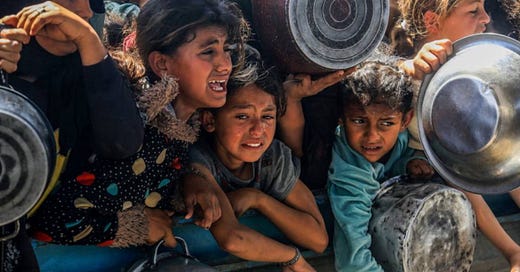There’s food. There’s fuel. There’s medicine. It’s all there, sitting on trucks, stacked in warehouses, ready to move.
But it doesn’t.
Because someone wants a different route. Because someone, somewhere, decided that it’s better for a child to starve than for a militant to potentially benefit.
There is no famine in Gaza, they say. Not yet. Not officially. The graphs haven’t crossed the threshold. The technical definitions aren’t met. 20% of households must face extreme lack of food. 30% of children must be acutely malnourished. 2 out of every 10,000 must die each day.
Then, and only then, can we call it what it already is.
In the meantime, half a million people are one step away from starvation. Aid workers are splitting rations in two, giving each child half a chance. Hospitals are offering powdered milk and prayers. And in Rafah, the World Food Programme has run out of flour.
This isn’t a drought or crop failure. This is man-made. Manufactured. Monitored. And justified.
There is aid. Tons of it. Trapped behind checkpoints and politics. It’s not that the world doesn’t have enough. It’s that it refuses to let it flow. Like watching someone die of thirst while holding a glass of water behind your back.
In some corners of the world, starvation is a symptom of scarcity. In Gaza, it is a strategy.
Israel says Hamas steals the aid. That it uses tunnels and civilians and international sympathy as cover. That no humanitarian system can operate in a war zone. And yet, it proposes private aid hubs patrolled by its own soldiers — a system the UN has rejected as both unworkable and unlawful.
The UN says it won’t participate in militarized logistics. Israel says it won’t trust the UN. The US says it’s concerned. And in Khan Younis, Dr. Ahmed al-Farah is watching five new cases of severe child malnutrition walk through his hospital doors every day.
The famine hasn’t been declared, but the hunger is visible. In bones. In bellies. In the blank stares of mothers who’ve run out of ways to explain why there’s nothing left to eat.
And so the waiting continues. Not just for trucks to be allowed through. But for the world to decide how much death qualifies as a crisis. How many children must die before the language catches up.
Because that’s the real absurdity. That famine is not measured in food, but in numbers. Not in need, but in thresholds. Not in the hollow eyes of the living, but in the cold count of the dead.
Meanwhile, tomatoes sell for $10 a kilo. UN warehouses are empty. And the ceasefire that was supposed to allow aid in has given way to airstrikes and rubble.
No one is pretending this is normal. But everyone is pretending it’s necessary.
That’s the part I can’t shake. The cruelty isn’t accidental. It’s negotiated.
Because in this version of hell, it’s not enough for people to be starving. They must starve correctly. Starve officially. Starve to specification.
Only then will the doors open.
Only then will the famine be real.
Only then will it be too late.





